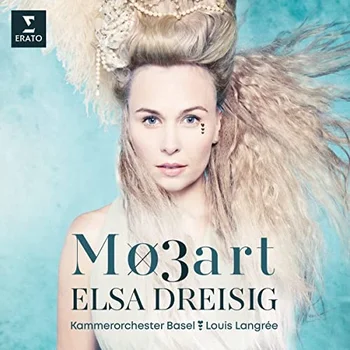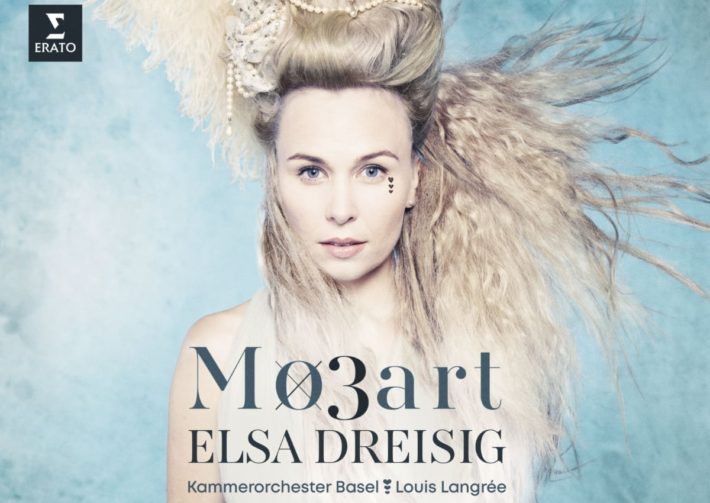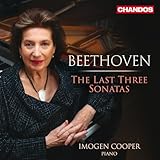It was Mozart who inspired French-Danish lyric soprano Elsa Dreisig to pursue a professional singing career; for her, his music is about balance because “nothing is written lightly and yet he never takes himself too seriously.” Her third solo album, an homage to the composer, also centers around a tripartite theme with arias from different characters in three each of his Da Ponte and seria operas.

Dreisig is clearly at home with all the roles in Così fan tutte, but her best one is as Dorabella (tracks 3 & 4). The recitative, in its most pointed moments, carries the vivid sting of the character’s resentment; the change at 0’25” is especially lovely and shows a versatility and variety in her timbre. In the aria itself, the supple intervallic leaps are right on point without the slightest feeling of labor. For all the technical acrobatics involved, she still maintains an unfailingly high level of energy.
Giunse alfin al momento (track 9) from Nozze di Figaro is nice but needs more contour and vibrance. Susanna’s spirited anticipation, feigned though it was intended in the opera, comes off sounding somewhat pale. One might refer to Netrebko/Harnoncourt’s performance here–the soloist’s fluidity generates the necessary drive, while the orchestra sounds appropriately restless in its introduction. Deh Vieni that follows benefits much more from the soprano’s smoothness and displays a confidence in her vocal range. Technical aspects aside, I found that Dreisig grasps the aria’s elegance and charm wonderfully; even the softest moments are invitingly mellow and velvety.
Dreisig brings out Cherubino’s youthfulness in Voi che sapete (track 10). There is a touch too much sostenuto but her strength in creating colors really comes through; moments of impressive vocal control show the lovely changes in dynamics and character. This aria, like so many others, faces stiff competition–and interesting comparisons. Frederica Von Stade (with Solti/London Philharmonic) is delightfully airy and has a more finessed approach that suits the small details in the phrases; the orchestra’s restrained elegance also helps to bring her effortlessly into the spotlight. Joyce DiDonato (with Ono/Lyon National Opera Orchestra) sings with a boldness that uncovers a rich warmth in the vocal line. Cecilia Bartoli (with Abbado/Vienna Philharmonic) runs at quite a brisk pace but one that complements her emphatic and effectively placed voice inflections. This might be my favorite of the four accounts mentioned as its extra bit of fiery character does set it apart from the rest.
The features from Idomeneo, as one of the most dramatic moments on the program, are possibly the best performances on the album. Here, the soprano doesn’t hold back in her vivid portrayal of Elettra’s despair and fury, but the emotions also don’t get in the way of her clear diction. Meanwhile, the orchestra infuses the drama with a sense of urgency and excitement.
While Pupille Amate from Lucia Silla (track 18) has a gentle sadness which is not out of place, a greater sense of poignancy might be more convincing. Once again, Dreisig shows mastery of the technical details like the small downward cascades that are impeccably clean. I also liked the sparser quartet accompaniment, which lends a more personal feel to the aria. But for me, Kiri Te Kanawa/ Sir Colin Davis is a version that really does it in terms of effectively portraying both grace and lament. Te Kanawa uses a tighter vibrato throughout and also shapes the leaps and crescendos with a sharper intensity that truly brings the aria’s words to life.
The liner notes provide short and generalized refreshers of the storylines’ presented acts – understandable given the established recognition of these operas. Dreisig’s forward is a nice addition that conveys her enthusiasm for Mozart, his music, and the way he portrays the female roles. I was a bit crestfallen, however, about the sound engineering, whose balance often puts too much weight upon the orchestra. While it did bring out some touches in the string pizzicatos and voicings, it occasionally came at the expense of the soloist.
While earlier distinguished recordings of these arias still stand out, Dreisig’s effort is nonetheless an enjoyable curation of Mozart’s most well-loved arias.
Recommended Comparisons
Netrebko | Von Stade | Bartoli | Te Kanawa
Mozart x 3
Elsa Dreisig – Soprano
Kammerorchester Basel
Louis Langrée – Conductor
Erato, CD 9029641225




















